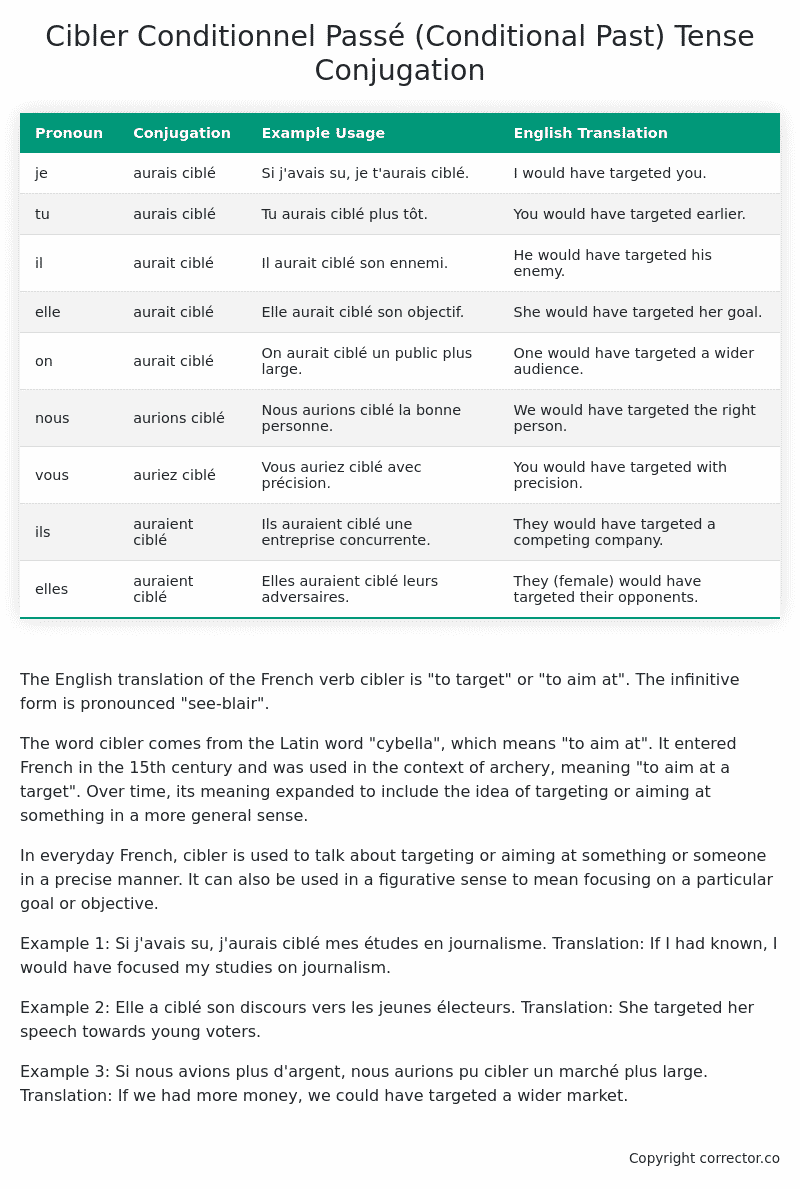Conditionnel Passé (Conditional Past) Tense Conjugation of the French Verb cibler
Introduction to the verb cibler
The English translation of the French verb cibler is “to target” or “to aim at”. The infinitive form is pronounced “see-blair”.
The word cibler comes from the Latin word “cybella”, which means “to aim at”. It entered French in the 15th century and was used in the context of archery, meaning “to aim at a target”. Over time, its meaning expanded to include the idea of targeting or aiming at something in a more general sense.
In everyday French, cibler is used to talk about targeting or aiming at something or someone in a precise manner. It can also be used in a figurative sense to mean focusing on a particular goal or objective.
Example 1: Si j’avais su, j’aurais ciblé mes études en journalisme.
Translation: If I had known, I would have focused my studies on journalism.
Example 2: Elle a ciblé son discours vers les jeunes électeurs.
Translation: She targeted her speech towards young voters.
Example 3: Si nous avions plus d’argent, nous aurions pu cibler un marché plus large.
Translation: If we had more money, we could have targeted a wider market.
Table of the Conditionnel Passé (Conditional Past) Tense Conjugation of cibler
| Pronoun | Conjugation | Example Usage | English Translation |
|---|---|---|---|
| je | aurais ciblé | Si j’avais su, je t’aurais ciblé. | I would have targeted you. |
| tu | aurais ciblé | Tu aurais ciblé plus tôt. | You would have targeted earlier. |
| il | aurait ciblé | Il aurait ciblé son ennemi. | He would have targeted his enemy. |
| elle | aurait ciblé | Elle aurait ciblé son objectif. | She would have targeted her goal. |
| on | aurait ciblé | On aurait ciblé un public plus large. | One would have targeted a wider audience. |
| nous | aurions ciblé | Nous aurions ciblé la bonne personne. | We would have targeted the right person. |
| vous | auriez ciblé | Vous auriez ciblé avec précision. | You would have targeted with precision. |
| ils | auraient ciblé | Ils auraient ciblé une entreprise concurrente. | They would have targeted a competing company. |
| elles | auraient ciblé | Elles auraient ciblé leurs adversaires. | They (female) would have targeted their opponents. |
Other Conjugations for Cibler.
Le Present (Present Tense) Conjugation of the French Verb cibler
Imparfait (Imperfect) Tense Conjugation of the French Verb cibler
Passé Simple (Simple Past) Tense Conjugation of the French Verb cibler
Passé Composé (Present Perfect) Tense Conjugation of the French Verb cibler
Futur Simple (Simple Future) Tense Conjugation of the French Verb cibler
Futur Proche (Near Future) Tense Conjugation of the French Verb cibler
Plus-que-parfait (Pluperfect) Tense Conjugation of the French Verb cibler
Passé Antérieur (Past Anterior) Tense Conjugation of the French Verb cibler
Futur Antérieur (Future Anterior) Tense Conjugation of the French Verb cibler
Subjonctif Présent (Subjunctive Present) Tense Conjugation of the French Verb cibler
Subjonctif Passé (Subjunctive Past) Tense Conjugation of the French Verb cibler
Subjonctif Imparfait (Subjunctive Imperfect) Tense Conjugation of the French Verb cibler
Subjonctif Plus-que-parfait (Subjunctive Pluperfect) Tense Conjugation of the French Verb cibler
Conditionnel Présent (Conditional Present) Tense Conjugation of the French Verb cibler
Conditionnel Passé (Conditional Past) Tense Conjugation of the French Verb cibler (this article)
L’impératif Présent (Imperative Present) Tense Conjugation of the French Verb cibler
L’infinitif Présent (Infinitive Present) Tense Conjugation of the French Verb cibler
Struggling with French verbs or the language in general? Why not use our free French Grammar Checker – no registration required!
Get a FREE Download Study Sheet of this Conjugation 🔥
Simply right click the image below, click “save image” and get your free reference for the cibler Conditionnel Passé tense conjugation!

Cibler – About the French Conditionnel Passé (Conditional Past) Tense
Formation
Common Everyday Usage Patterns
Expressing Unreal Past Scenarios
Polite Requests or Suggestions
Expressing Doubt or Uncertainty
Interactions with Other Tenses
Conditional Present
Indicative Past Tenses
Conditional Future
Summary
Want More?
I hope you enjoyed this article on the verb cibler. Still in a learning mood? Check out another TOTALLY random French verb conjugation!


